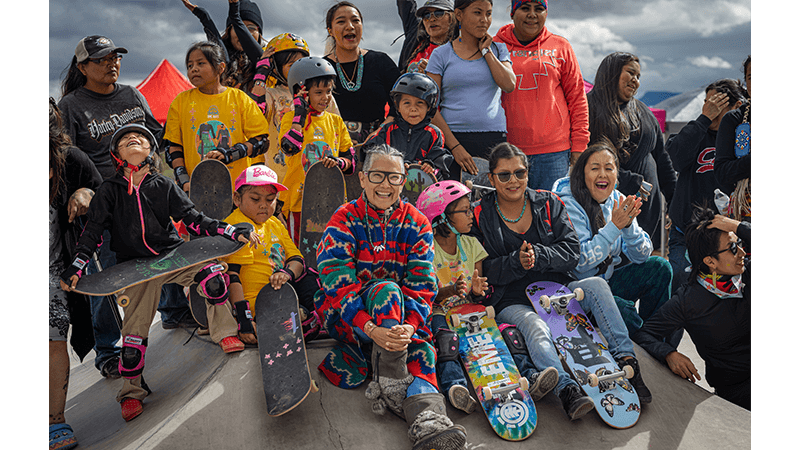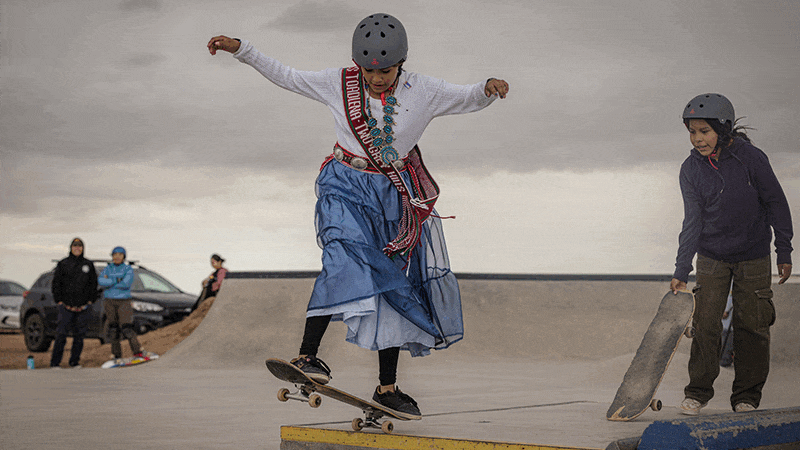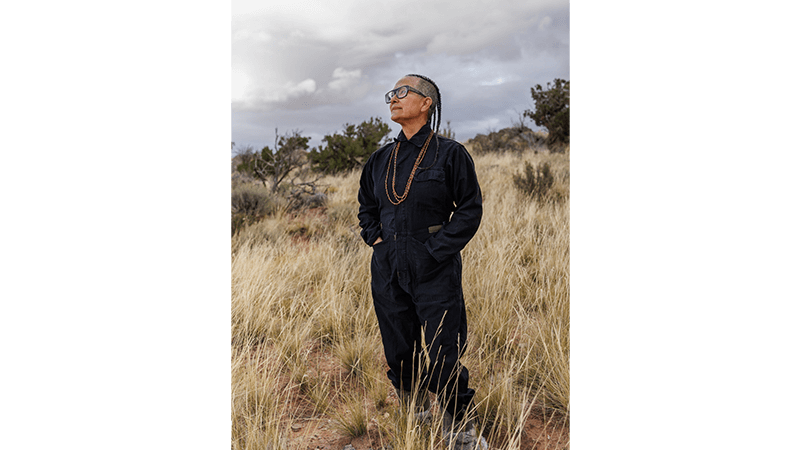The Fashion Creative Empowering The Next Generation Of Navajo Women
Hundreds gathered on a sunny day in late September for the Modern Matriarchs Skate Jam (MMSJ) – a skateboarding competition for women and girls on the Navajo Nation. Some skaters donned beanies, Vans and hoodies, while others wore traditional moccasins and skirts. The atmosphere was joyful – Vanessa Bowen, a Diné product designer (the Navajo people call themselves Diné), deejayed and Rosie Archie, a pro-skater and Indigenous skate advocate, sang an Indigenous women’s warrior song.

The event was held at the Diné Skate Garden Project, which opened last year in the middle of Navajo Nation – near the Chuska Mountains, around 200 miles from Albuquerque, New Mexico. (Navajo Nation, which at 27,000 square miles is the largest reservation in the US, covers land across Arizona, Utah and New Mexico.) Navajo Nation’s first woman vice president Richelle Montoya was among the supporters at the inaugural MMSJ, while women-founded skate collective GrlSwirl led skate workshops.
“It was cool that we got to skate with mainly women and no boys, because sometimes when you’re skating [the boys] can get aggressive,” says 13-year-old Cheyenne Rosie Jones of the MMSJ event. “I saw how good other girls were and how they were skateboarding.”
Many organisations contributed to the MMSJ and Diné Skate Garden Project, but fashion designer and community activist Amy Denet Deal was instrumental in both. Deal is the creative director and founder of 4KINSHIP, a sustainable artwear brand that also serves as a platform for her community work. For her, the Diné Skate Garden Project is a transformative space for Diné youth and their families to gather, learn new skills and gain confidence.
“To say that I’m Indigenous, to say I’m Navajo, to say I’m Diné, came with the responsibility to my community,” she says. “It really means stepping into being a community member… to try to create positive change.”

As well as improving confidence and benefitting mental health, introducing sports such as skateboarding allows Navajo girls to dream big, says Deal, as events such as the MMSJ introduce them to Indigenous women who’ve created successful careers around the sport. “After I saw all that stuff, I was talking about it a lot to my friends,” says Jones. “We started talking about making our [own] brand.” Jones came in second in the contest for her age group and hopes to have a career related to skateboarding.
Deal’s community work was born out of a desire to reconnect with her heritage, having been adopted and raised outside of Navajo Nation. Her birth mother, Joanne, left for Cleveland, Ohio, in the 1960s as part of the Indian Relocation Act when she wasaround 18 years old. Not long after she became pregnant with Deal, who was adopted by a white family in 1964. When Deal grew up, she lived all over the world, from New York and Boston to Germany, but was eventually based in Los Angeles, where she worked in corporate fashion.
Although Deal knew her birth mother was Diné from an early age, it wasn’t until she was in her thirties that she was able to connect with her mother and eventually visit Navajo Nation. “Coming home was really important to me because I knew there was something missing all those years, but you can’t put your finger on it until you come back,” she says. She remembers the beauty of meeting her relatives for the first time but was also shocked, “because I did not realise the inequity that existed.”
Prior to the skate park’s opening, many children in this native community skated on the highway, says Deal. Up to 35% of Navajo Nation households live under the US federal poverty threshold (the national level is 12.7%) and around 30% of people don’t have access to clean drinking water. Many struggle with shortages of electricity and internet access, and recreational sports opportunities are few.

Since the opening of the skate park, 4KINSHIP has distributed approximately 1,000 skateboards and helmets, and established weekly mentorship sessions for skateboarding. “It was really important to me that we just don’t irresponsibly hand out equipment, that we actually do that in schools, where our Diné skate mentors come and work with the kids,” says Deal.
She describes moving back to Navajo Nation in 2019 as the most important thing she’s done, helping to improve her mental health and allowing for further connection to her Diné identity. “For me, being adopted out and coming back home, I have a unique way I see my indigeneity because of the pathway that I came into it,” she says. “I feel like it’s important to me as a community leader, as an older auntie… there has to be a safe space created where everyone can express their indigeneity in their own way. And that’s the beauty for me of the Diné Skate Garden Project, because it is that space. It’s a space for these young women to be who they want to be, and we’re going to always be protective of that.”
Her latest project is fundraising for $200,000 to distribute an additional 5,000 skateboards and launch the KINSHIP Hózhó Yoga Project – an initiative to introduce yoga to Navajo Nation youth.
Deal also dreams of opening a skate park within every 50-mile radius on the reservation and, of course, plans to host the MMSJ again this September. “We are expecting some pretty major athletes coming out of this tiny little community,” she says.
5 More Fashion Brands Founded By Indigenous Creatives
- B.Yellowtail– A fashion and lifestyle brand by Bethany Yellowail, a citizen of the Northern Cheyenne Nation, and a descendent of the Apsáalooke (Crow) Nation.
- Ginew – The first Native denim brand founded by Amanda Bruegl (Oneida, Stockbridge-Munsee) and Erik Brodt (Ojibwe).
- Tania Larson– An eponymous label by the Indigenous artist and designer of Gwich’in fine jewellery.
- Jamie Gentry Designs– Bespoke moccasins by Jamie Gentry from Kwakwaka’wakw Nation.
- Urban Native Era– Loungewear by Lipan Apache designer Joey Montoya.
- ThunderVoice Hat Co – a Diné and Totonac-owned Native fashion brand.
Katie C Reilly is a writer based in California. She covers women’s health, mental health and parenting for titles including The New York Times Magazine, Elle, The Washington Post and The Cut




